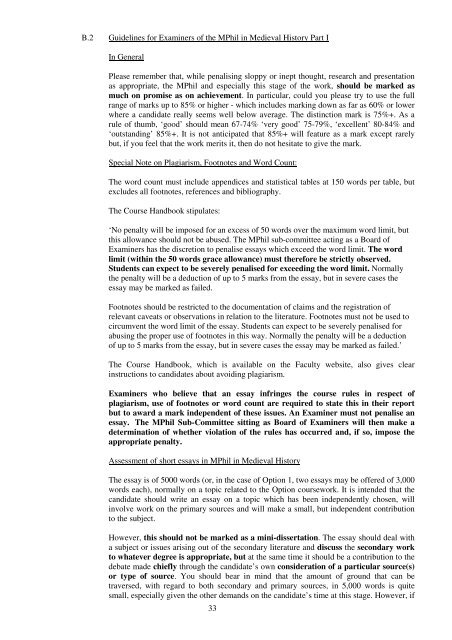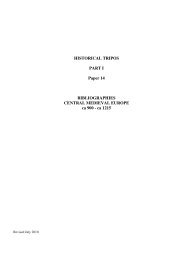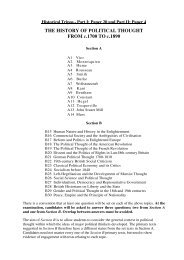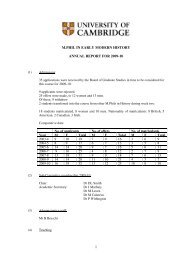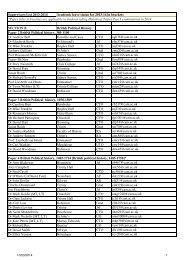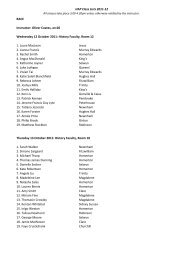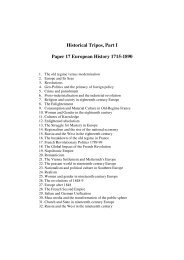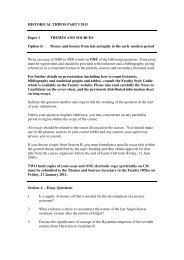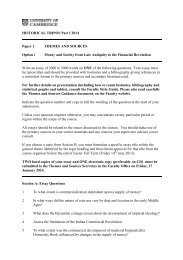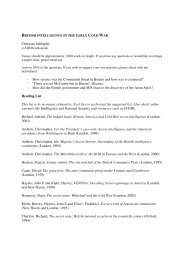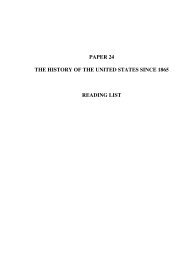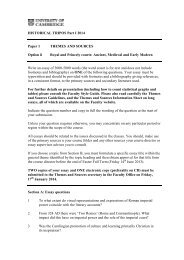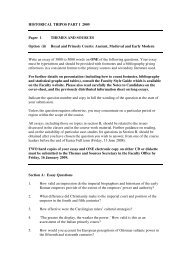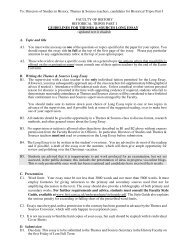Course Handbook - Faculty of History
Course Handbook - Faculty of History
Course Handbook - Faculty of History
Create successful ePaper yourself
Turn your PDF publications into a flip-book with our unique Google optimized e-Paper software.
B.2 Guidelines for Examiners <strong>of</strong> the MPhil in Medieval <strong>History</strong> Part I<br />
In General<br />
Please remember that, while penalising sloppy or inept thought, research and presentation<br />
as appropriate, the MPhil and especially this stage <strong>of</strong> the work, should be marked as<br />
much on promise as on achievement. In particular, could you please try to use the full<br />
range <strong>of</strong> marks up to 85% or higher - which includes marking down as far as 60% or lower<br />
where a candidate really seems well below average. The distinction mark is 75%+. As a<br />
rule <strong>of</strong> thumb, ‘good’ should mean 67-74% ‘very good’ 75-79%, ‘excellent’ 80-84% and<br />
‘outstanding’ 85%+. It is not anticipated that 85%+ will feature as a mark except rarely<br />
but, if you feel that the work merits it, then do not hesitate to give the mark.<br />
Special Note on Plagiarism, Footnotes and Word Count:<br />
The word count must include appendices and statistical tables at 150 words per table, but<br />
excludes all footnotes, references and bibliography.<br />
The <strong>Course</strong> <strong>Handbook</strong> stipulates:<br />
‘No penalty will be imposed for an excess <strong>of</strong> 50 words over the maximum word limit, but<br />
this allowance should not be abused. The MPhil sub-committee acting as a Board <strong>of</strong><br />
Examiners has the discretion to penalise essays which exceed the word limit. The word<br />
limit (within the 50 words grace allowance) must therefore be strictly observed.<br />
Students can expect to be severely penalised for exceeding the word limit. Normally<br />
the penalty will be a deduction <strong>of</strong> up to 5 marks from the essay, but in severe cases the<br />
essay may be marked as failed.<br />
Footnotes should be restricted to the documentation <strong>of</strong> claims and the registration <strong>of</strong><br />
relevant caveats or observations in relation to the literature. Footnotes must not be used to<br />
circumvent the word limit <strong>of</strong> the essay. Students can expect to be severely penalised for<br />
abusing the proper use <strong>of</strong> footnotes in this way. Normally the penalty will be a deduction<br />
<strong>of</strong> up to 5 marks from the essay, but in severe cases the essay may be marked as failed.’<br />
The <strong>Course</strong> <strong>Handbook</strong>, which is available on the <strong>Faculty</strong> website, also gives clear<br />
instructions to candidates about avoiding plagiarism.<br />
Examiners who believe that an essay infringes the course rules in respect <strong>of</strong><br />
plagiarism, use <strong>of</strong> footnotes or word count are required to state this in their report<br />
but to award a mark independent <strong>of</strong> these issues. An Examiner must not penalise an<br />
essay. The MPhil Sub-Committee sitting as Board <strong>of</strong> Examiners will then make a<br />
determination <strong>of</strong> whether violation <strong>of</strong> the rules has occurred and, if so, impose the<br />
appropriate penalty.<br />
Assessment <strong>of</strong> short essays in MPhil in Medieval <strong>History</strong><br />
The essay is <strong>of</strong> 5000 words (or, in the case <strong>of</strong> Option 1, two essays may be <strong>of</strong>fered <strong>of</strong> 3,000<br />
words each), normally on a topic related to the Option coursework. It is intended that the<br />
candidate should write an essay on a topic which has been independently chosen, will<br />
involve work on the primary sources and will make a small, but independent contribution<br />
to the subject.<br />
However, this should not be marked as a mini-dissertation. The essay should deal with<br />
a subject or issues arising out <strong>of</strong> the secondary literature and discuss the secondary work<br />
to whatever degree is appropriate, but at the same time it should be a contribution to the<br />
debate made chiefly through the candidate’s own consideration <strong>of</strong> a particular source(s)<br />
or type <strong>of</strong> source. You should bear in mind that the amount <strong>of</strong> ground that can be<br />
traversed, with regard to both secondary and primary sources, in 5,000 words is quite<br />
small, especially given the other demands on the candidate’s time at this stage. However, if<br />
33


